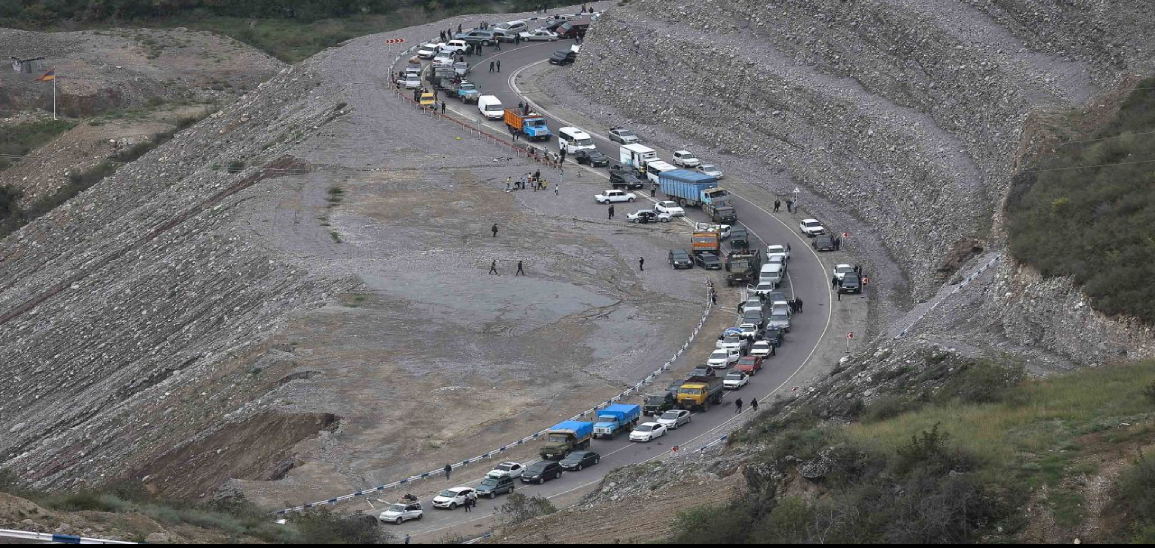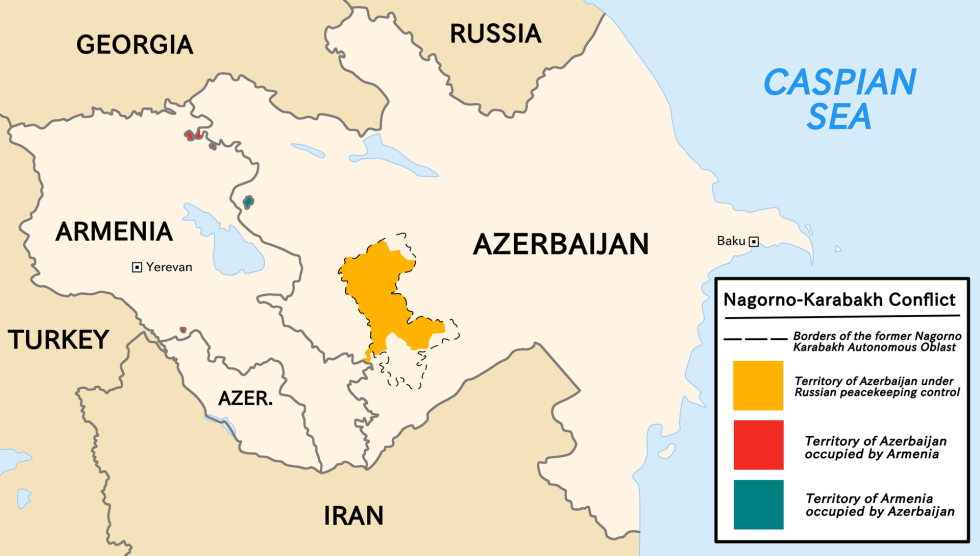Nagorno-Karabakh: End of the Road
September 30, 2023 | Expert Insights

Away from the glare of global media, on September 21, a meeting was held at the Azerbaijani town of Yevlakh where representatives of the Armenian-backed Karabakh groups conferred with the victorious Azerbaijanis for the 'reintegration' of Nagorno-Karabak into Azerbaijan according to the Azerbaijan constitution," as reported by the Azerbaijani media. This marked the culminating scenes of a conflict that commenced at the collapse of the Soviet Union and has lingered on for nearly half a century.
However, the surrender of Armenian arms did not signal peace returning to the region; fearful of Azerbaijani revenge, thousands have fled into Armenia, causing accusations of 'ethnic cleansing' emanating from Yerevan. As per Al Jazeera, more than a third of the 120,00 ethnic Armenians habiting in the disputed enclave have fled into Armenia. Engrossed with Ukraine, global powers have no time for this unfolding tragedy, which has, in a period of less than a month, changed the enclave's fate.
Background
The conflict between Armenia and Azerbaijan is a leftover from the period immediately following the end of the Cold War. Both Armenia and Azerbaijan were once part of the Soviet Union. Armenia is overwhelmingly Christian. Azerbaijan is a Turkic Muslim state. History and tradition make these two natural rivals. Yet, this rivalry did not exist under the USSR, at least not overtly. It was subsumed supposedly under a much wider Soviet identity.
Nagorno-Karabakh was established as a separate enclave with a majority Armenian population within Azerbaijani territory by authorities in Moscow in 1923. At that time, the Azeris could do nothing about this. They had to accept the diktat coming down from above. The Soviets always wanted to dilute national identity inside their borders. The establishment of this enclave was part of this plan.
But history’s pages did eventually start to turn. As the core of the Soviet Union went into a meltdown, it could no longer hold on to the peripheral regions. Long-dormant national identities began to re-emerge. In the case of Armenia and Azerbaijan, this meant national identities were mutually opposed to each other. Nagorno-Karabakh suddenly became the bone of contention between these two newly independent countries. Throughout the 1990s, they fought over this issue. External powers also aligned with these two countries in this period. Russia supported Armenia, while Turkey decided to stand by Azerbaijan as a fellow Muslim country.

Analysis
Territorial disputes are always complicated. When religion and ethnicity are involved in them, they become emotional. Both sides in such conflicts do not think logically. Instead, they look at the other side as an existential threat.
For the Armenians, oppression is a familiar story. The Armenian Genocide carried out by the Ottoman Empire at the end of the First World War is still not recognized by Turkey. The Armenians preserved their religion under centuries of Turkish and later Soviet domination. There are few Armenians living in areas outside Armenia proper. Nagorno-Karabakh is one such area.
The Azeris, too, are a proud people. They came to this region along with Turkic invaders. Islam acted as a glue to the various Azeri tribes. They have always wanted to establish contact with the Turks of Anatolia, but geopolitics always stood in the way.
When a territorial dispute is based on the status of an enclave, things get much more complicated. There are two points of view here. On the one side is the population residing in the enclave. They have been living here for centuries. For them, the land is their native soil. Unless force is used, they will never consider leaving. On the other side is the nation-state within which the enclave is situated. For this country, what matters is its territorial integrity. To maintain this, it is willing to go to any extent.
In the earlier wars between Armenia and Azerbaijan, there were horrific casualties. However, in none of these wars was there such a large movement of refugee population as is currently taking place. Then, what is the factor which has changed in the present conflict? The main change has been in third-party intervention. Rarely, if ever, does a bilateral dispute end on its own. An outside presence is needed most of the time.
Russia was such a mediator once upon a time. Now, Moscow’s priorities have shifted with the war in Ukraine. Russian peacekeepers have not been reinforced. As a result, they have lost their credibility with both sides.
Azerbaijan has taken full advantage of this. It has sensed a golden opportunity. What it could not achieve in decades was now a distinct possibility. The Azeris played their hand carefully. They decided to hit the Nagorno-Karabakh enclave, where it hurt the most.
This is the Lachin corridor. The corridor which connects the Armenian enclave with mainland Armenia. It is a vital lifeline. All kinds of supplies pass through this corridor. These consist of food and other basic necessities. Apart from this, weapons are also transported through this. The jugular vein of Nagorno-Karabakh is located right here. If Azerbaijan could cut off this corridor, it could win the war without firing a shot.
Earlier also, the Azeris tried to cut off this corridor. However, they were always thwarted by Russia and its peacekeepers. Baku has had a free hand to enforce a blockade on the Lachin corridor for nearly a year. The effect of this was predictable. The Armenian enclave got considerably weakened. The population suffered. When the final Azeri assault took place, it was a mere formality. The enclave offered token resistance before collapsing. The Armenians could not do anything about their subjugated brethren other than watch helplessly.
The fallout of all this has been devastating. A humanitarian crisis has developed in the Caucasus. Relief agencies are unable to reach the affected zone.
The internal implications within Armenia have also been sharp. The Armenian people have come out into the streets. They want their government to do something rather than plead helplessness. The Armenian Prime Minister Nikol Pashinyan already has a bad reputation. He is seen more as an appeaser than a bold nationalist. Appeasement to aggression only invites more aggression. The loss in Karabakh ratchets up domestic pressure on the Armenian Prime Minister after he faced stinging criticism at home for making concessions to Azerbaijan without getting anything in return in 2020. Pashinyan has denied that his army is in the enclave and has said that he expects that Russian peacekeepers would ensure that ethnic Armenians in Karabakh could stay “in their homes, on their land”.
Geo-politically, this crisis will increase tensions in the wider region. When Turkey began to take the Russian position on the war in Ukraine, it seemed that Moscow and Ankara were on the same page. With the outcome of the Nagorno-Karabakh conflict almost decided, things have changed. Russia has been shown to be an impotent power here. Turkey’s policy towards Azerbaijan has been vindicated. Iran is also a strong ally of Armenia. Tehran and Ankara, too, were at loggerheads with each other when both supported opposite sides in the Syrian Civil War. It is possible that this regional rivalry will reawaken now.
Where does India and Pakistan come into this equation? Apparently, it looks like a conflict in such a far-off place has no bearing on South Asia. But India has been slowly building up its relationship with Armenia. Military agreements have been signed between Yerevan and New Delhi. Heavy weaponry has passed from India through Iranian territory to reach Armenia. Pakistan, like its ally Turkey, has placed its bets with Azerbaijan. With the Russians in no position to assist them, the Armenians needed an external power to back them up. India has fulfilled such a role. Pakistan has also supplied heavy armaments to Azerbaijan.
How does this conflict ultimately end? Even now, the outflow of refugees from the enclave can be averted. For this, the international community must step up its game. And here, it is not just Russia, which has failed to live up to its image. The United States, too, has failed. Washington has been distracted by the war in Ukraine, just like Moscow.
International institutions and laws are built to maintain peace. Yet, much too often, the exigencies of realpolitik ensure that the good intentions of these global frameworks are never translated into action. In Armenia and Azerbaijan, we are once again seeing history repeat itself in this regard.
Assessment
- The world has been obsessed with the Ukraine war for more than a year. Azerbaijan took advantage of this distraction to change the status quo in Nagorno-Karabakh in its favour by the force of arms assisted by a year-long blockade to strangle military opposition.
- The conflict between Armenia and Azerbaijan is not an old one. It is a consequence of the evolution of the post-Cold War era. The question is whether a victory won by force of arms will lead to sustainable peace, especially when a large segment of the population is of a rival ethnicity. Only time will tell if Baku, which has clearly won the military conflict, can win the peace.
- The ethnic divide is so deeply entrenched it will take a lot of time and a great deal of reconciliation effort to close the century-old wounds. It can only be hoped that now that fighting has finally ceased, the international community, especially the regional powers, will contribute to peace rather than furthering their national agenda in this sensitive region by meddling in its affairs.








Comments